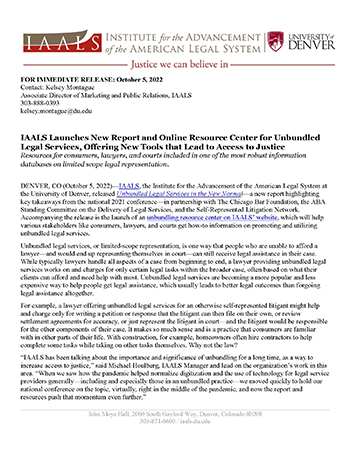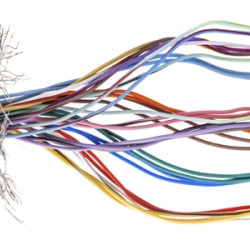IAALS Launches New Report and Online Resource Center for Unbundled Legal Services, Offering New Tools that Lead to Access to Justice
Resources for consumers, lawyers, and courts included in one of the most robust information databases on limited scope legal representation.
 IAALS, the Institute for the Advancement of the American Legal System at the University of Denver, released Unbundled Legal Services in the New Normal—a new report highlighting key takeaways from the national 2021 conference—in partnership with The Chicago Bar Foundation, the ABA Standing Committee on the Delivery of Legal Services, and the Self-Represented Litigation Network. Accompanying the release is the launch of an unbundling resource center on IAALS’ website, which will help various stakeholders like consumers, lawyers, and courts get how-to information on promoting and utilizing unbundled legal services.
IAALS, the Institute for the Advancement of the American Legal System at the University of Denver, released Unbundled Legal Services in the New Normal—a new report highlighting key takeaways from the national 2021 conference—in partnership with The Chicago Bar Foundation, the ABA Standing Committee on the Delivery of Legal Services, and the Self-Represented Litigation Network. Accompanying the release is the launch of an unbundling resource center on IAALS’ website, which will help various stakeholders like consumers, lawyers, and courts get how-to information on promoting and utilizing unbundled legal services.
Unbundled legal services, or limited-scope representation, is one way that people who are unable to afford a lawyer—and would end up representing themselves in court—can still receive legal assistance in their case. While typically lawyers handle all aspects of a case from beginning to end, a lawyer providing unbundled legal services works on and charges for only certain legal tasks within the broader case, often based on what their clients can afford and need help with most. Unbundled legal services are becoming a more popular and less expensive way to help people get legal assistance, which usually leads to better legal outcomes than forgoing legal assistance altogether.
For example, a lawyer offering unbundled legal services for an otherwise self-represented litigant might help and charge only for writing a petition or response that the litigant can then file on their own, or review settlement agreements for accuracy, or just represent the litigant in court—and the litigant would be responsible for the other components of their case. It makes so much sense and is a practice that consumers are familiar with in other parts of their life. With construction, for example, homeowners often hire contractors to help complete some tasks while taking on other tasks themselves. Why not the law?
“IAALS has been talking about the importance and significance of unbundling for a long time, as a way to increase access to justice,” said Michael Houlberg, IAALS Manager and lead on the organization’s work in this area. “When we saw how the pandemic helped normalize digitization and the use of technology for legal service providers generally—including and especially those in an unbundled practice—we moved quickly to hold our national conference on the topic, virtually, right in the middle of the pandemic, and now the report and resources push that momentum even further.”
The three-day event highlighted that while there is increased use of technology and scalable unbundled services in this “new normal”—which makes starting an unbundled practice easier—important startup and ethical considerations remain for practitioners in this space, in addition to needed increased support by courts. The conference created a forum where an array of stakeholders shared their perspectives, gained better insights into collaborative roles, and learned about best practices to advocate for this service delivery model.
“The conference was so instrumental in bringing stakeholders from every part of the process together to talk about their experience with unbundling,” said Katherine Alteneder, Consulting Senior Strategic Advisor for the Self-Represented Litigation Network. “What we know is that everybody needs to be on board for this to work.”
The new resources from IAALS are designed to ease the implementation of unbundling and overcome any lingering hesitancy by the profession. In the past, lawyers have been hesitant to provide unbundled services because they didn’t know how to get started or feared being stuck to a case past what they agreed to. And, judges and courts haven’t promoted unbundled services heavily because it was an uncommon practice they didn’t know much about and didn’t know which attorneys provided such services. These new IAALS resources include strategies and plans to help bring courts and attorneys together to establish this model and bring increased legitimacy.
Unbundled Legal Services in the New Normal details insights on how to establish an unbundled practice; when and how to integrate technology tools in a practice, including how to identify opportunities for the productization of legal services; important issues in ensuring that an unbundled practice adheres to professional ethics obligations; and how courts can be an essential partner to unbundled practitioners and an important leader in supporting the widespread implementation of the unbundled model.
“The report and the accompanying online resources are robust tools that provide a great starting point for all stakeholders interested in unbundling, including private practitioners, the courts, legal aid, educators, and legal consumers,” said Jessica Bednarz, Associate Director of Innovation and the JEP for The Chicago Bar Foundation. “Ideally, stakeholders within each legal community will come together to plan and share resources and this report offers models for collaboration and strategic planning that will help each community do just that. I encourage everyone to check it out!”



